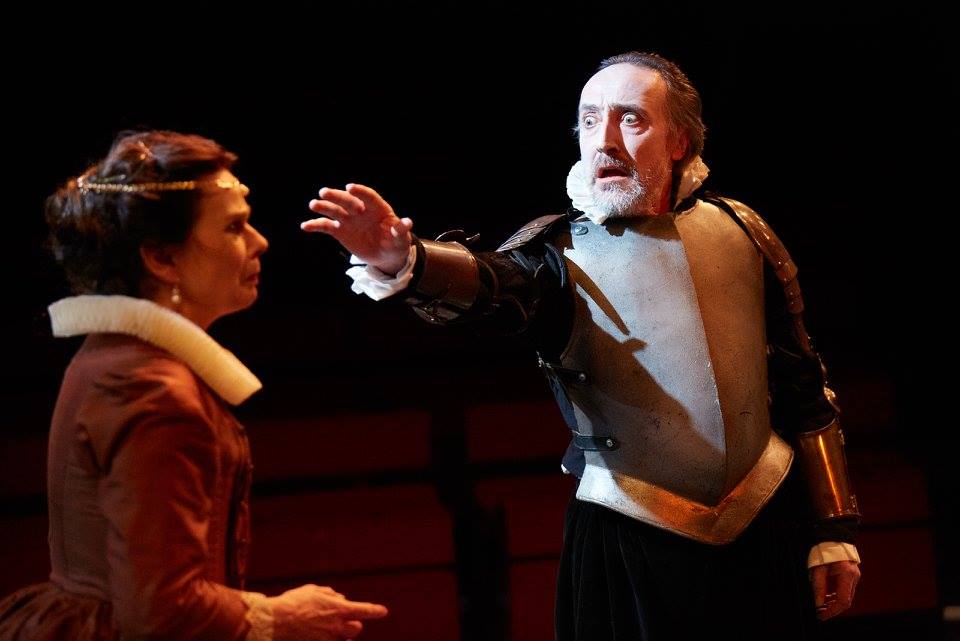
There are critics who measure all performances of the great roles against some supposed ideal; Holness ought to be such and such, Othello ought to be so and, this Macbeth didn’t have that quality, Portia should have done it like this and so on. How tiresome! Would the world be better off if Shakespeare had left detailed notes on how his plays should be played and staged? Of course not. Give us a different Shylock, make us look again at Prince Hal. That’s not to say anything goes. All plays have an internal logic wrought from theme and plotting and revealing this is perhaps Andrew Hilton’s greatest strength.
Hamlet in its various editions, running, potentially, into a testing four hours plus, stands as a kind of national monument for which too much material has been ordered by the surveyor. The cornerstones and foundations set, the architect can play with the remaining bricks and decorations to their own content. Mr Hilton has given us a digestible three hours, including interval, with no frills (lady gravedigger notwithstanding) or ulterior motives. It is an ‘anniversary’ production in Elizabethan costume which does not try to be clever in some clumsily relevant way and gives instead as clear an exegesis as one could hope. He has given us that rare beast these days, an actor’s production that leans on the text rather than novel interpretation. His Hamlet (Alan Mahon) is cast to match.
He starts the ascent with a sullen urgency and like an actor too long starved of good lines so determined to feast on all of them, does not allow distraction to take the edge off the pace. Of the palette available to Hamlet; anger and rage, terror, love and scorn, wit, remorse, it is the first that leaves its mark in the memory. Here is a young man, neither particularly scholarly nor martial, but moodily nursing a bête noir. Rarely in repose, his chief weapon is a blunt sarcasm. This is a Hamlet who knows what he needs to do, but bungles it. The, ‘Too solid flesh’, speech is to the audience as a lawyer laying out the case for the prosecution. The self-reproach he feels in the players’ easy emotions leads to working himself up in the, ‘rogue and peasant slave’ speech, whilst the doubts he subsequently has seemingly come not from any prolonged introspection, for he shows us the book he is reading which apparently prompts his, ‘To be, or not to be:’ soliloquy.
An apologetic Claudius (Paul Currier) is a king who one feels might have reasoned Gertrude into his bed rather than charmed. A smooth politician in fact, whose animal powers, such as they are, are strictly rationed and used rather as an emollient than as a release of passion. This is a king who we feel has had a sudden, uncharacteristic, attack of ambition, which he later bitterly regrets.
Julia Hills shows us a Gertrude nursing doubts about her conduct from the outset, which gives the lie to Claudius’s, ‘Th’imperial jointress to this warlike state’, in the first court scene. She seems a woman troubled and not a ‘jointress’ to anything but guilt. Her maternal instinct thus needs little coaxing to Hamlet’s cause. Her ‘Willow’ monologue is done with great tenderness.
Of the rest Ophelia (Isabella Marshall) and Polonius (Ian Barritt) deserve special mention. Polonius in particular is believably an advisor to a king on the brink of war. Mr Barritt’s portrayal is a pedant to be sure, but by no means the bumbling ninny that should have been pensioned ten years prior. His is a loving and considerate father offering gilt-edged advice to his children and who applies unbiased common sense to the problems of his employers. If he is wrong about Hamlet it is because he has been well deceived.
Isabella Marshall’s Ophelia, the dutiful daughter, if indeed distracted to madness by the death of her father, is clearly jolted into a release of the sexual repression resulting from an overprotective father and brother. An innocent at court, she is broken by the events which swirl around her.
Andrew Hilton has carefully assembled his construction materials into something recognizable and solid. Yet like Richard Rogers’ Lloyd’s building he has put all the workings of the building in clear view. ★★★★☆ Graham Wyles 17th February 2016

